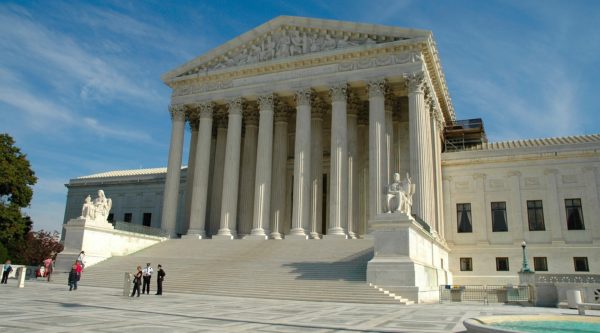Zubik v. Burwell
AT ISSUE
Religious nonprofits challenged the religious exemption provided to them in the Affordable Care Act’s contraceptive mandate. The consolidated cases include religiously affiliated hospitals, schools and other nonprofit charities (including one often mentioned in news coverage: Little Sisters of the Poor).

BJC’S POSITION
BJC filed a friend-of-the-court brief in this case explaining how the far-reaching arguments made by these nonprofits can endanger religious liberty.
The government provided a system that exempts religious nonprofit organizations from any obligation to contract, arrange, pay or refer for contraception in their health insurance plans. Instead, coverage is provided through secular insurers, so that employees are not denied full and equal health benefits. These organizations claim that the accommodation procedure – which involves filling out paperwork to register an objection – violates the organizations’ rights under the Religious Freedom Restoration Act (RFRA).
Houses of worship, denominational associations, and other closely related entities are automatically exempt from the contraceptive mandate, though many choose to provide the coverage.
The brief makes clear the importance of RFRA’s standard in creating exemptions, sometimes referred to as “accommodations,” to policies that substantially burden religious exercise. It also points out that the government must have the ability to enact permissive exemptions that apply to specific situations. Religious exemptions that relieve burdens on religious objectors while protecting government interests should be encouraged – not threatened with “all or nothing” demands.
“The government has provided a careful system of exemptions that responds to religious objections about contraception without depriving thousands of employees important health care benefits,” said BJC General Counsel Holly Hollman. “This is the win-win solution the Court pointed to in the Hobby Lobby case.”
STATUS
In an unexpected move, the U.S. Supreme Court issued a short, unsigned opinion on May 16, 2016, that sent the contraceptive mandate cases back to the lower courts without ruling on whether the accommodation for religious employers violates the 1993 Religious Freedom Restoration Act (RFRA). Instead, it instructed the lower courts to give the parties an opportunity to reach a compromise based upon the refined positions in their supplemental briefs submitted after oral arguments. That order asked religiously affiliated nonprofits and the government to address how the organizations’ employees could receive seamless contraceptive coverage without the organizations providing separate notification of their objection.
“Today’s decision does not resolve the controversy, nor will it necessarily change the results in the lower courts that previously ruled in favor of the government,” said BJC General Counsel Holly Hollman. “It does, however, allow the parties to further refine their arguments about notice requirements and how employees will be covered.”
The Court’s decision encouraged the parties in the case to find an acceptable compromise. After President Donald Trump’s inauguration, the federal government began settling these cases and attempted to create a new, broad exemption to the contraceptive mandate without any requirement for secular insurers to step in and provide coverage for the objecting entities.
After several states sued, that new exemption has been halted — for now — by the federal courts. Ultimately, religious nonprofits are approaching the inclusion of contraceptive coverage for their employees and/or students in different ways. Some religious nonprofits include it as part of their health insurance plans, and even some who sued over the exemption process provided to them have decided to utilize the exemption after all.
From the Brief
“Absolute deference to claimants would produce absurd results that would discredit the cause of religious liberty. These petitioners say they cannot do business with any insurer that separately provides contraception to their employees; others might say they cannot do business with any insurer that provides contraception to anyone. Some believers think God will punish the country if controversial public policies are not reversed. Petitioners’ theory requires absolute deference to all such claims.”
“Some substantial-burden cases may be difficult, but many, including these cases, are amenable to bright-line rules. Religious objectors are not entitled to exemptions for secular entities they deal with at arm’s length, or to control the government’s regulation of such entities.”
“Petitioners’ theory of absolute deference to religious claims of substantial burden would lead to absurd results that would discredit RFRA and the cause of religious liberty. It would increase the political pressure for repeal or damaging amendments to both the federal RFRA and the many state RFRAs.”
“No matter how they describe it, their objection seeks to control their secular insurance companies and the government’s regulation of those companies. The acts required of them are purely incidental; they would have the same objections if the government required nothing of them.”
Featured
Resources
Podcast: Supreme Court in July! (July 16, 2020)
Analysis of the consolidated contraceptive mandate decisions in 2020
Supreme Court upholds administration rules expanding religious accommodations from the contraceptive mandate
BJC update on the Trump v. Pennsylvania decision on July 8, 2020
Podcast: Not a charm: Contraceptive mandate returns to the Supreme Court for the third time
May 7, 2020, discussion about Trump v. Pennsylvania and its relationship to the Zubik case.
Frequently Asked Questions about Zubik v. Burwell (PDF)
BJC’s friend-of-the-court brief (PDF)
“‘All or nothing’ Obamacare objections threaten religious liberty”
By Holly Hollman for Religion News Service (March 21, 2016)
Podcast with Holly Hollman on the contraceptive mandate cases
Podcast after oral arguments with Brent Walker and Jennifer Hawks
Brent Walker and Jennifer Hawks on Zubik v. Burwell oral arguments
Watch Brent Walker’s comments to reporters at the Supreme Court on C-SPAN
Recap of oral arguments
By BJC Blogger Don Byrd
“How the Little Sisters of the Poor case puts religious liberty at risk”
By Douglas Laycock (author of BJC brief) for The Washington Post




